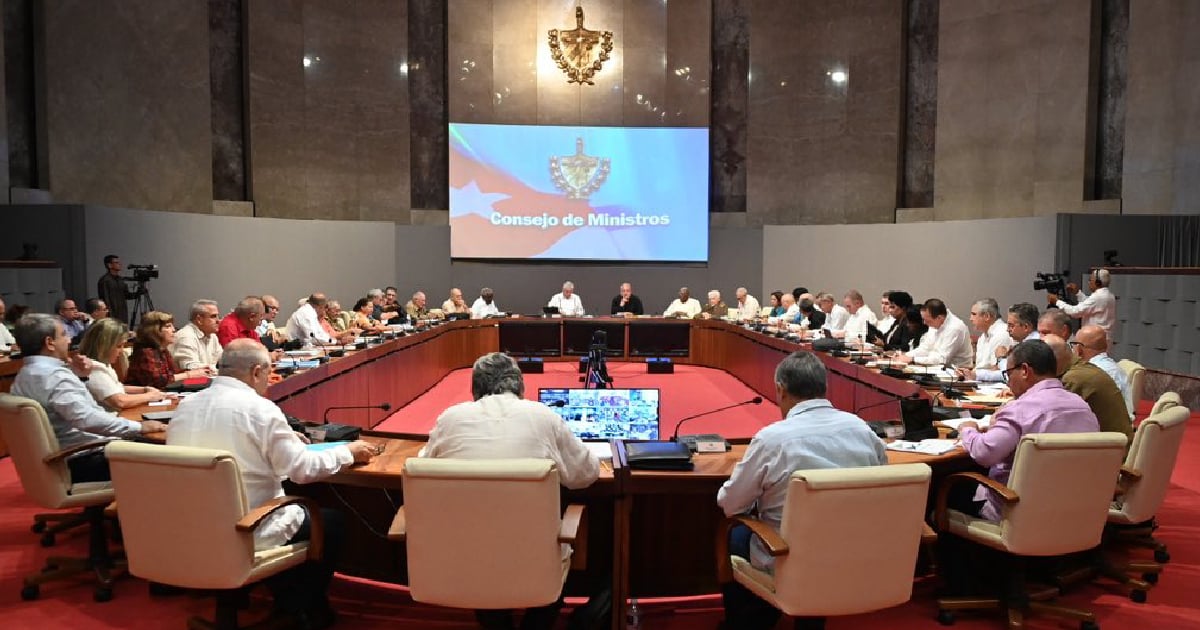The economist Pedro Monreal has warned about the stagnation in the rhetoric of Cuban leaders, following his analysis of the island's press report on the latest Council of Ministers meeting. "The note on the recent meeting of the Council of Ministers of Cuba reveals a government body bogged down in worn-out rhetoric, vague communication of results and actions, and an economic team seemingly bewildered by the country's macro destabilization," Monreal stated on X, a platform he uses to analyze the Cuban economy.
He also expressed concern that this monthly meeting, held by the country's top leadership, precedes the session of the National Assembly of People's Power (ANPP), scheduled for July 17 at the Palacio de las Convenciones in Havana. "For being the meeting prior to the Parliament session in July, the note on the Council of Ministers is sparse on data and replaces them with vague references. It reports the well-known fact that the economy declined in 2023 but continues to conceal the exact figure," highlighted the prominent economist, whose opinions are shared by many Cubans.
In the mentioned meeting, the Minister of Economy and Planning, Joaquín Alonso Vázquez, referred to the economic performance at the end of 2023, an activity that "shows a decline compared to the previous year and the estimate for the first half of 2024," as reported by the official newspaper Granma. Granma also notes that the first topic will be addressed in the ANPP session, while the second remains "a complex situation."
Monreal's Detailed Critique
This particular statement prompted Monreal to seek a deeper analysis than what can be summarized by the Communist Party of Cuba's official organ, Granma. "There is a tangled reference to the 'performance' of the economy in the first half of 2024 without specifying any growth or decline data of the GDP. It was said that the situation remains complex, which seems to indicate the continuation of stagflation," the economist emphasized.
Monreal questioned the assertion, made without data, which speaks of an "excessive" price increase, something the government describes as "a completely speculative matter." "Speculation might influence, but inflation is mainly the result of low supply response capacity and a monstrous fiscal deficit," he added.
He pointed out that this assertion is worrying, especially when understanding that "if the ministerial economic team truly believes that the inflation unleashed since the 'ordering' is due to speculation and not the structural transformations caused by the 'ordering,' then they will have a very hard time resolving the current messes," he warned.
In another message, Monreal criticized how the established writing by the media confuses the reader. "A planned deficit for 2024 equivalent to 18.5% of GDP is not the kind of thing that can be put in the same sentence as 'macroeconomic stabilization.' That was the center of the 'plan' presented, but now it seems that this 'creature' causes fright," he accused.
Meanwhile, he pointed out that "the proposed solution to reduce the deficit seems vague and would rather rely on a fortuitous event: the 'non-execution' of planned expenses probably associated with the lack of foreign currency that prevents executing expenses in national currency within the framework of programs."
In general terms, the economist cited two issues he considered, one less relevant, when the report refers to the preparation of the Economic Plan and the State Budget for 2025. "Experience indicates that this preparation works more like a kind of bureaucratic gymnastics and as an act of ideological faith," he added.
The second, more striking in his view, was the mention of "postponing and even paralyzing investments that are not essential." On this particular, he made two observations: "without investment, there is neither growth nor development, and so far the 'essential' investments have been in tourism, will they continue?" he questioned.
Finally, he warned that maintaining the narrative of a "war economy," used to justify the attempt at total control, "is not so much that there is a 'war economy,' rather that it must be believed."
During the same meeting held in April, this same government body confirmed the worsening of the economic crisis in Cuba. On that occasion, Prime Minister Manuel Marrero Cruz said: "it is true that the best production levels and performance will not be achieved, but it is possible to move forward if we fully exploit collective intelligence." An approach that offers few solutions to an increasingly difficult context for Cuban survival.
FAQs on Cuba's Economic Challenges
Given the complexities and concerns surrounding Cuba's economic situation, here are some frequently asked questions that delve deeper into the current challenges and potential solutions.
What are the main factors behind Cuba's current economic crisis?
Cuba's economic crisis is primarily driven by a combination of low supply response capacity, a significant fiscal deficit, and structural issues resulting from recent economic 'ordering' measures.
How is inflation affecting the Cuban economy?
Inflation in Cuba is leading to an increase in prices, which the government attributes to speculation. However, experts argue that it is mainly due to a low supply response and a massive fiscal deficit.
What role does investment play in Cuba's economic development?
Investment is crucial for economic growth and development. Currently, essential investments in Cuba are focused on tourism. However, without broader investments, sustainable growth is unlikely.
